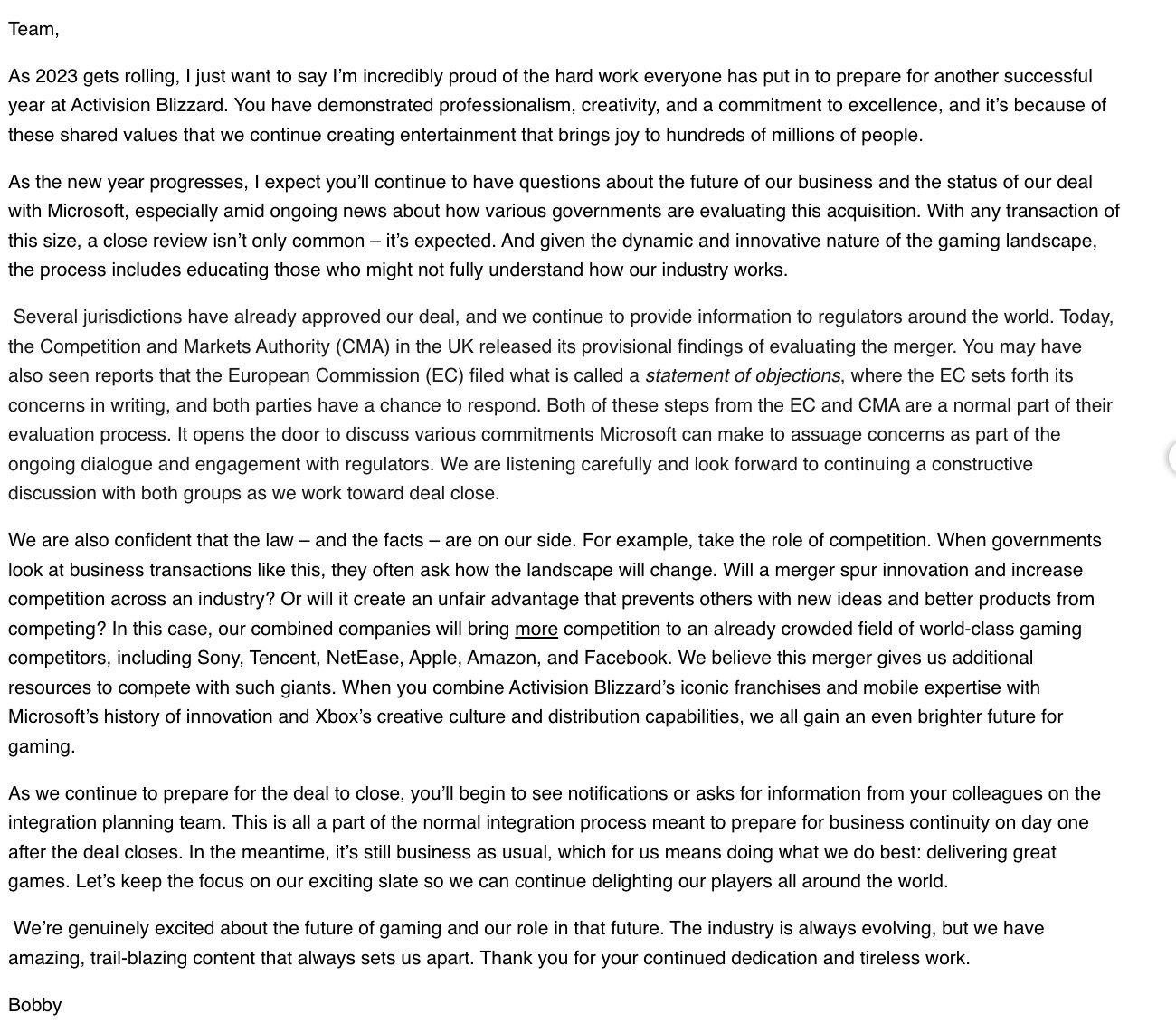UnknownSouljer
[H]F Junkie
- Joined
- Sep 24, 2001
- Messages
- 9,041
UPDATE 4:
https://arstechnica.com/gaming/2023...n-case-shows-us-regulator-isnt-giving-up-yet/
BBC Comentary
UPDATE 3:
https://arstechnica.com/?p=1923472
Sony explains why it wants the merger blocked: they don’t trust Bethesda.
UPDATE 2: Turns out the FTC is also blocking the merger now.
https://www.ign.com/articles/ftc-xbox-playstation-activision-blizzard-cma-merger-analysis
https://mspoweruser.com/microsoft-t...erger-offer-remedies-at-eu-hearing-next-week/
UPDATE: Microsoft to propose remedies to the EU Commissions in private meeting.
So, the merger was stopped cold in its tracks by the EU commission, Microsoft is obviously trying to do what they can do to salvage it.
https://www.gov.uk/government/news/microsoft-activision-deal-could-harm-uk-gamers
Part of the problem for mega-corps is that they have to go through multiple international bodies. It was almost a certainty that Microsoft wouldn't be able to pass scrutiny from all the international bodies necessary for the merger. I'm not a corp expert/lawyer, but I would assume that it's impossible or near impossible for Microsoft to continue with the merger now.
My commentary is: the only remaining move(s) might be to buy parts or studios/IPs, but not necessarily all of it. The best gamers can hope for is Blizzard breaks off and becomes independent again and Sony/Microsoft split-up and buy the rest (with perhaps other big companies buying parts like Square-Enix, or Ubisoft, or whatever). It's likely that Activision/Blizzard still wants to sell. Their market is up, their IP is as valuable as it can be, but their management sucks. Better to sell out now before they crash the ship. That was ultimately the big thing that Microsoft would've given them, which was getting rid of poor management (and money, but the business itself obviously makes money).
If you didn't catch the initial announcement/discussion, here is the previous forum thread on the subject relating to when Microsoft started the process of attempting to obtain Activision/Blizzard: https://hardforum.com/threads/microsoft-to-buy-activision-blizzard.2017006/
(Edits are: spelling/grammar, not content)
https://arstechnica.com/gaming/2023...n-case-shows-us-regulator-isnt-giving-up-yet/
FTC appeal in Microsoft/Activision case shows US regulator isn’t giving up yet
But stopping the deal from moving forward still looks like an uphill battle.BBC Comentary
UPDATE 3:
https://arstechnica.com/?p=1923472
Sony explains why it wants the merger blocked: they don’t trust Bethesda.
andEven if the CMA tried to enforce a so-called "behavioral remedy" to keep Call of Duty multi-platform, that move would not "address the myriad ways Microsoft could circumvent its obligations," Sony wrote. Sony also said Microsoft has a "history of non-compliance with behavioral commitments," pointing to Bethesda as well as previous broken commitments regarding Windows and Internet Explorer.
In its own filing with the CMA, Microsoft noted once again that it "has no intention of... making Call of Duty exclusive to the Xbox platform" and that its proposed agreements with Sony would mean the PlayStation versions would match those on Xbox "on release date, content, features, upgrades, quality, and playability." Microsoft proposed a monitoring trustee, an objective third-party assessor, and a fast-track dispute-resolution mechanism to help enforce those promises.
For Sony, though, it seems there is no enforcement regime or set of magic words that will make the company trust and accept Microsoft's ownership of Activision and Call of Duty. The only solution that Sony would accept is one proposed by the CMA itself: Microsoft fully divesting the Activision or Call of Duty businesses post-acquisition. The CMA is set to make its final decision on the matter by April 26.
UPDATE 2: Turns out the FTC is also blocking the merger now.
https://www.ign.com/articles/ftc-xbox-playstation-activision-blizzard-cma-merger-analysis
The FTC’s argument against Microsoft is that by acquiring Activision Blizzard it would “substantially lessen competition” in the “relevant market,” per antitrust law as laid out in the Clayton Act. Effectively, the FTC believes that if Microsoft absorbed Activision Blizzard, their combined powers would allow them to monopolize the games market and hurt potential competitors like Nintendo or Sony in ways they couldn’t reasonably compete with.
https://mspoweruser.com/microsoft-t...erger-offer-remedies-at-eu-hearing-next-week/
UPDATE: Microsoft to propose remedies to the EU Commissions in private meeting.
So, the merger was stopped cold in its tracks by the EU commission, Microsoft is obviously trying to do what they can do to salvage it.
https://www.gov.uk/government/news/microsoft-activision-deal-could-harm-uk-gamers
"A CMA investigation has provisionally concluded that Microsoft's proposed acquisition of Activision could result in higher prices, fewer choices, or less innovation for UK gamers," says the regulator in a press release. "[This follows] a wide-ranging investigation conducted over the last five months to understand the market and potential impact of the deal."
"This has included holding site visits and hearings to hear directly from business leaders at Microsoft and Activision," it continues, "analyzing over 3 million internal documents from the two businesses to understand their views on the market, commissioning an independent survey of UK gamers, and gathering evidence from a range of other gaming console providers, game publishers, and cloud gaming service providers."
Part of the problem for mega-corps is that they have to go through multiple international bodies. It was almost a certainty that Microsoft wouldn't be able to pass scrutiny from all the international bodies necessary for the merger. I'm not a corp expert/lawyer, but I would assume that it's impossible or near impossible for Microsoft to continue with the merger now.
My commentary is: the only remaining move(s) might be to buy parts or studios/IPs, but not necessarily all of it. The best gamers can hope for is Blizzard breaks off and becomes independent again and Sony/Microsoft split-up and buy the rest (with perhaps other big companies buying parts like Square-Enix, or Ubisoft, or whatever). It's likely that Activision/Blizzard still wants to sell. Their market is up, their IP is as valuable as it can be, but their management sucks. Better to sell out now before they crash the ship. That was ultimately the big thing that Microsoft would've given them, which was getting rid of poor management (and money, but the business itself obviously makes money).
If you didn't catch the initial announcement/discussion, here is the previous forum thread on the subject relating to when Microsoft started the process of attempting to obtain Activision/Blizzard: https://hardforum.com/threads/microsoft-to-buy-activision-blizzard.2017006/
(Edits are: spelling/grammar, not content)
Last edited:
![[H]ard|Forum](/styles/hardforum/xenforo/logo_dark.png)
